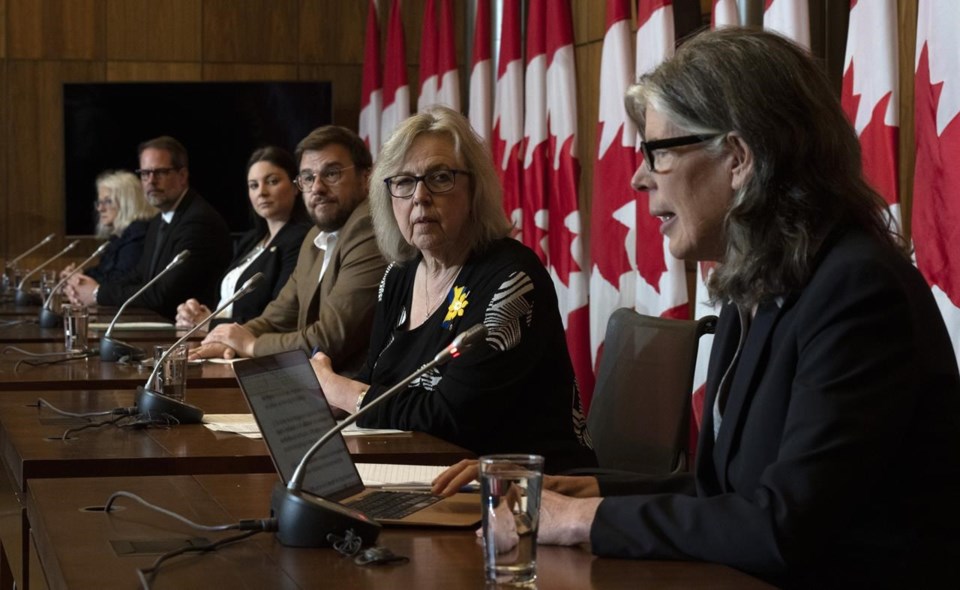OTTAWA — Prime Minister Justin Trudeau insists Canada is "very serious" about developing nuclear technology across the country to meet growing power needs, but some members of Parliament, including one from his own caucus, are warning the technology could be costly and ineffective.
The federal government started actively exploring small modular reactor technology in 2018 and two years later published an action plan which described them as a strategic Canadian asset that could leverage significant economic, geopolitical, social and environmental benefits.
Small modular reactors, often referred to as SMRs, use similar technology to traditional nuclear power plants, but they are much smaller and can be built in one location and then moved to where they will operate. They produce enough power for a maximum of around 300,000 homes, while a traditional plant has more than double that output.
The government sees them as a critical part of its ability to fulfil future electricity demands, and meet its greenhouse gas emissions reduction targets.
"Nuclear is on the table, absolutely," Trudeau said, during a post-budget announcement in British Columbia earlier this month.
He doubled down on that position during a visit to the University of Ottawa Monday, telling the crowd a return to nuclear is something the government is "very, very serious in and investing in some of the small module reactors."
"We're going to have to be doing much more nuclear over the coming decades," he said.
But Green Leader Elizabeth May said other renewable energy sources are getting cheaper, so there's not much of a case for Canada to expand its capacity on that technology, which she said is being pushed by powerful lobbyists.
"There'd be no interest in small modular reactors if it wasn't for the pro nuclear lobby," she said. "It's not based on evidence."
Liberal MP Jenica Atwin, who was first elected in 2019 under the Green banner and crossed the floor to the Liberals in 2021, agreed with May. She is at odds with her new party over the small nuclear reactors but said it is her personal opinion and she is responsible for bringing the voices of her constituents forward to Ottawa.
"I'm used to being an outlier, oftentimes, so I think people can see that by now," she said. "I've had conversations with my colleagues and you know, they're certainly open to pursuing research and understanding more about the process."
Environment Minister Steven Guilbeault, a former environmental activist acknowledged Tuesday he was opposed to nuclear energy but now believes it is needed to keep global warming to as close as possible to 1.5 C above pre-industrial temperatures.
"In the past I haven’t been the person who supported the most the development of nuclear energy," he said Tuesday. "But when you look at what international experts like the International Energy Agency or the (Intergovernmental Panel on Climate Change) is saying, they’re saying, to prevent global temperatures from reaching 1.5 degrees Celsius, to achieve our carbon neutrality targets, we need this technology."
The International Energy Agency says renewable energy like wind and solar will "lead the push to replace fossil fuels" but nuclear can help in countries where it is accepted.
The Intergovernmental Panel on Climate Change's latest report on climate change said nuclear power costs have grown because of construction costs and project delays but agreed it is a strategic option for some countries trying to reduce emissions.
Four nuclear energy stations generate about 15 per cent of Canada's electrical grid today, mostly in Ontario and New Brunswick. As the facilities age more attention is being paid to the potential of smaller, more-portable reactors.
While a handful of small module reactors are in development or under construction around the globe, they are not a widely used source of power generation anywhere in the world.
Susan O'Donnell, an adjunct professor at the University of New Brunswick and spokesperson for the Coalition for Responsible Energy Development, said small module reactors "don't exist."
"They haven't been built yet, and one of the reasons that we're here today is because they are such a bad investment that private sector money isn't rolling into them," she said. "They're going to need billions of dollars in public funds."
In February Canada promised $29.6 million over four years to launch a program to develop supply chains for small modular reactors and fund research on safely dealing with their nuclear waste,
Electricity Canada said Tuesday said more electricity is needed to meet Canada's zero emissions goal and nuclear power is required to do that.
"Small modular reactors are a game changing technology necessary to electrifying Canada," the organization said in a statement. "They can provide stable, affordable baseload power and support the integration of variable renewables."
Estimates suggest Canada needs to double or triple its power output by 2050 to meet demand as many industries electrify to reduce emissions.
This report by The Canadian Press was first published April 25, 2023.
David Fraser, The Canadian Press



